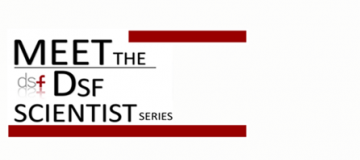
Meet the Dsf scientist series: Elisabetta Groaz
 |
Elisabetta has been recently appointed as a tenure-track researcher (RTDb) at DSF
Tell us about yourself: what is your educational and academic background?
I was raised in Italy and studied at the University of Padova where in 2001 I obtained a M.Sc. degree in Chemistry and Pharmaceutical Technology. During my last year as an undergraduate student, I welcomed the chance to participate in an Erasmus research stay at King’s College London’s Department of Chemistry (UK). By experiencing for the first time the unique thrill of scientific discovery and becoming part of a vibrant academic community, I had no hesitation in further pursuing postgraduate studies in the same research group. Under the supervision of Prof. Michael North, I contributed to original research in transition metal catalysis including the use of ruthenium initiators to push the boundaries of conventional cascade metathesis reactions. After completing my PhD in 2006, my research interests took a bracing new direction when I joined the Rega Institute for Medical Research (KU Leuven, Belgium) as a postdoctoral research assistant in the Medicinal Chemistry laboratory directed by Prof. Piet Herdewijn. Since 2019, I hold a position as Research Expert at this institution that for decades has been at the forefront of antiviral research. Following a long time spent abroad, my academic and personal journey continues now in a peculiarly familiar place.
Can you summarize in few words your research?
My research has the aim of exploring uncharted biological functions driven or encoded by non-natural nucleoside and nucleic acid analogues. It pursues the disruptive design of (bio)chemical tools with the inherent potential of introducing means and capabilities to both drug discovery and biotechnology that up to now were largely considered impracticable. This extends from synthetic molecules that can act as inactive precursors of therapeutic agents to others that may function as substrates of processing enzymes such as polymerases or act as catalysts in cellular metabolism.
What is the most challenging part of your work?
Most of the frustrations arise from the fact that the field is not moving as quickly as many other scientific areas since progresses are mostly incremental rather than radical. This is hardly surprising given the multidisciplinary nature of the research and particularly the fact that new in vivo modes of action and paths are often involved, of which we have little understanding. On the other hand, as the pace slowly picks up, I am genuinely excited about contributing to the research in this field and impatient to witness the impact of future discoveries.
What is the most satisfying part of your work?
The most rewarding aspect of my work is having the opportunity to closely interact with scientists specialized in different disciplines, who are nonetheless engaged in addressing the same or related scientific problems. Challenging my beliefs and taking a new perspective can be a very enriching experience.
What are your outside hobbies?
I am passionate about learning new languages as I believe there is so much information and meaning of words that are lost in translation. I am currently a fluent speaker of 4 languages, which has greatly helped me to forge deeper connections with people from different cultures. Other than this, I am fond of yoga and very much enjoy reading fiction, which at this moment seems the safest option to travel to different places!





